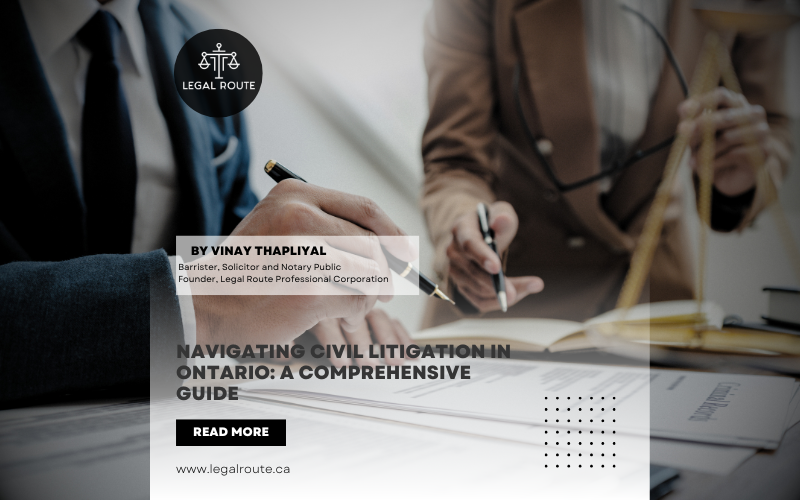
Navigating Civil Litigation in Ontario: A Comprehensive Guide
Civil litigation in Ontario is the legal process through which disputes between individuals, businesses, or other entities are resolved in court. Whether you are the plaintiff (the party bringing the lawsuit) or the defendant (the party being sued), understanding the various stages of civil litigation is essential for navigating the legal system effectively. This comprehensive guide provides an in-depth overview of the key stages in the litigation process, common challenges, and strategies for success in both roles.
Navigating Civil Litigation in Ontario: A Comprehensive Guide
By Vinay Thapliyal, Legal Route Law Firm
Civil litigation in Ontario can feel overwhelming, whether you’re planning to sue someone or defending yourself against a lawsuit. At Legal Route, we’re committed to helping you understand each step of the litigation process so you can make informed decisions and protect your interests.
Below is a detailed guide to civil lawsuits in Ontario, including common legal terms, practical insights, and how our team can help you achieve the best possible outcome.
What is Civil Litigation?
Civil litigation is the legal process used to resolve disputes between individuals, businesses, or organizations. Unlike criminal cases, civil cases usually involve compensation or the enforcement of legal rights rather than punishment.
Common civil litigation cases in Ontario include:
- Breach of contract disputes
- Debt recovery
- Property disputes
- Business disagreements
- Employment disputes
- Personal injury lawsuits
- Defamation claims
Key Stages in a Civil Lawsuit in Ontario
1. Pleading Stage: Starting the Lawsuit
The lawsuit begins when the plaintiff (the person starting the claim) files a Statement of Claim with the court. This document sets out:
- What the dispute is about
- The facts supporting the claim
- The legal reasons for the claim
- The remedy or compensation sought
The defendant then files a Statement of Defence, responding to the allegations. They can:
- Deny the claims
- Admit certain facts
- Raise new facts in their defence
- File a counterclaim (a claim against the plaintiff)
- File a third-party claim if they believe another party is responsible for the damages
Tip: It’s crucial to prepare these documents accurately, as errors can delay your case or weaken your position.
2. Discovery Phase: Exchanging Information
The discovery stage is where both sides gather and exchange evidence. This helps clarify the facts and identify the strengths and weaknesses of each party’s case.
Key parts of discovery include:
- Document Production: Exchanging relevant documents (emails, contracts, financial records, etc.)
- Examinations for Discovery: Parties and witnesses answer questions under oath, similar to an interview.
- Interrogatories: Written questions exchanged between parties requiring written answers.
Discovery ensures transparency and helps parties prepare for trial or settlement discussions.
3. Pre-Trial Conference and Settlement Discussions
Before a trial, Ontario courts often schedule a Pre-Trial Conference. A judge or court official facilitates this meeting to:
- Explore the possibility of settlement
- Narrow down the issues
- Save time and costs
Alternative Dispute Resolution (ADR) methods like mediation and arbitration are also common:
- Mediation: A neutral mediator helps parties negotiate a voluntary settlement.
- Arbitration: An arbitrator hears evidence and makes a binding decision.
Settling out of court often saves time, stress, and legal costs.
4. Trial: Presenting Your Case in Court
If a settlement isn’t reached, the case proceeds to trial. Both parties present their evidence and legal arguments in front of a judge (or sometimes a jury).
A typical trial includes:
- Opening Statements: Outlining the key issues and what each side intends to prove.
- Presentation of Evidence: Calling witnesses, submitting documents, and cross-examining the other party’s witnesses.
- Closing Arguments: Summarizing the evidence and urging the judge to rule in your favour.
The judge then makes a decision and may award costs to the successful party.
Common Challenges in Civil Litigation
Complex Legal Rules
Ontario’s Rules of Civil Procedure can be complex and strict. Missing deadlines or filing incorrect documents can harm your case. An experienced lawyer helps ensure compliance and protects your rights.
Evidence Collection
Building a strong case requires:
- Collecting relevant documents
- Interviewing witnesses
- Gathering expert opinions if needed
We assist clients with collecting and organizing evidence to strengthen their case.
Negotiating a Fair Settlement
Many civil lawsuits settle before trial. Negotiating a settlement requires:
- A clear understanding of your legal rights
- Knowledge of the opposing party’s position
- Strategic negotiation skills
At Legal Route, we protect your interests and work toward a fair outcome.
Why Work with a Civil Litigation Lawyer?
Representing yourself in civil litigation can be risky. A skilled lawyer:
- Protects your legal rights
- Guides you through complex procedures
- Prepares persuasive legal arguments
- Helps you avoid costly mistakes
- Increases your chances of achieving a favourable result
The Legal Route Advantage
At Legal Route, we combine legal expertise with practical strategies. We help you:
- Understand your legal options
- Navigate court procedures confidently
- Explore settlement opportunities
- Prepare effectively for trial if needed
Whether you’re pursuing a claim or defending one, we are committed to achieving efficient, cost-effective, and favourable outcomes for our clients.
Contact Legal Route
If you’re facing a civil dispute or considering filing a lawsuit in Ontario, we’re here to help.
📞 Call or Text us at 905-283-8514
✉️ Email: info@legalroute.ca
🌐 Visit: www.legalroute.ca
Disclaimer
The information provided in this blog post is for general informational purposes only and does not constitute legal advice. Reading this blog does not create a lawyer-client relationship. For advice specific to your situation, please consult a qualified lawyer.
.png)
.png)
.png)
.png)